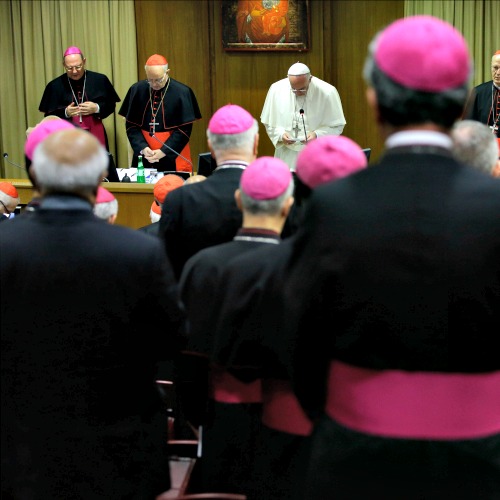Synod Fathers Approve Summary of Final Message
A more detailed report of the document will be published after another round of discussion.

VATICAN — The final message of the third Extraordinary Synod of Bishops on the Family has been praised for its emphasis on the beauty and joy of the family, the quality of its “stimulating” content and its synthesis of the main issues.
Critics, however, have said the message, published on the eve of the final day of the two-week ecclesial gathering, sends out “weak and ambiguous” signals on the Church’s positions on sexual morality.
The three-and-a-half-page document, which was approved by 158 out of 174 synod fathers, serves as a short summary of the synod. The final, more detailed report (relatio sinodali) is expected to be published shortly after synod fathers vote on the document Saturday afternoon.
The message avoids references to reported disputes and impassioned debates during the fortnight, instead praising the “dialogue” during the synod that it says has been “mutually enriching, helping us to look at the complex situations which face families today.”
Recalling Christ’s words: “Behold, I stand at the door and knock. If anyone hears my voice and opens the door, I will enter his house and dine with him and he with me,” it notes how Jesus would enter village houses.
“In your homes, there are light and shadow,” the message says. “Challenges often present themselves and at times even great trials. The darkness can grow deep to the point of becoming a dense shadow, when evil and sin work into the heart of the family.”
The message says the synod fathers recognize the “great challenge” to remain faithful in conjugal love, and it recognizes that “enfeebled faith and indifference to true values, individualism, impoverishment of relationships” leave their mark on family life.
Noting the frequent crises in marriage, it points to how failures can give rise to “new relationships, new couples, new civil unions and new marriages, creating family situations which are complex and problematic, where the Christian choice is not obvious.”
It mentions the burdens of suffering that can arise within the family but speaks of admiration for the fidelity of families “who endure these trials with courage, faith and love” and view them not as a burden inflicted on them, but as “something in which they themselves give, seeing the suffering Christ in the weakness of the flesh.”
The synod fathers condemn the “the idolatry of money and the dictatorship of an impersonal economy lacking a truly human purpose,” which weakens the dignity of people. They also remember the unemployed, the powerless, youth without hope, victims of war, families forced to be refugees and those persecuted because of their faith.
Women who suffer violence and exploitation, victims of human trafficking and abused children are also highlighted in the document.
“The culture of prosperity deadens us,” the message says, and it calls on governments to uphold the rights of the family for the common good.
“Christ wanted his Church to be a house with doors always open to welcome everyone,” the message continues. “We warmly thank our pastors, lay faithful and communities who accompany couples and families and care for their wounds.”
The second part of the message reasserts the complementarity of men and women, saying each “remains different from the other that opens self and is revealed in the reciprocal gift.” It esteems the importance of conjugal love, which it says is “unique and indissoluble, endures despite many difficulties. It is one of the most beautiful of all miracles and the most common.”
It points out that “fertility and generativity” involves not only procreation but also includes “the capacity to offer life, affection and values — an experience possible even for those who have not been able to bear children.”
The journey of the family, which it underlines is an “authentic domestic church,” is sometimes a “mountainous trek with hardships and falls,” the synod fathers say, but “God is always there to accompany us.” It says Christian spouses are “called to become teachers of faith and of love for young couples as well.”
The message defines “fraternal communion” as charity and giving, as well as nearness to those who are last, marginalized, poor, lonely, sick, strangers and families in crisis, aware of the Lord’s word.
And it points out how the first stage of the synod was dedicated to the Eucharist and how to accompany those who have been divorced and remarried.
It ends with a prayer calling on the Lord to help with various pastoral challenges to the family.
At a press briefing on the message Saturday afternoon, Cardinal Gianfranco Ravasi, president of the Pontifical Council for Culture and president of the Commission for the Message, and Cardinal Oswald Gracias, archbishop of Bombay (Mumbai), India, said the essential message draws on the Old Testament and offers words of “consolation and comfort” to families facing contemporary difficulties.
‘Splendor, Beauty and Richness’
He said the document also explains the “splendor, beauty and richness” of the family in a “light and soft” literary style. He further said the “final destination” of the family is the Eucharist and then explained how the “first step” of the synod was to reflect on access to the sacraments for the divorced and “remarried.”
On that and other issues, Cardinal Ravasi said the message highlighted how the Church should first welcome and then listen and understand the changes in society.
Cardinal Raymond Burke, prefect of the Supreme Tribunal of the Apostolic Signatura, said Friday that the Pope’s silence on the divorce-and-remarriage issue is causing harm to the Church.
Asked if the Holy Father has a position on possibly relaxing rules to allow Communion to the divorced and “remarried,” Cardinal Oswald Gracias, archbishop of Bombay, told the briefing that it is being studied, and the Pope “wants everyone to reflect and walk together.” For the Pope to give a position would be “twisting things in the wrong direction,” as he wants to know first what “bishops think” and the “pastoral situation,” he said.
Cardinal Ravasi said it is “fundamental” that Pope Francis remains silent about the issue at this stage in order to allow others to express their opinions.
Yet this approach has not been accepted by everyone. Speaking to the Register on Saturday, Opus Dei Father Robert Gahl, professor of moral philosophy at the Pontifical University of the Holy Cross in Rome, said: “The Holy Father’s silence on vexing questions leaves the Church in suspense.” He added that this suspense “is intensified by the ambiguities” of the interim report on the synod, “because we all expect our faith to be confirmed by the Successor of Peter.”
‘Weak and Ambiguous’
Voice of the Family, a coalition of pro-family groups, criticized the final message for sending out “weak and ambiguous” signals about the Church’s stance on sexual morality. Cardinal Raymundo Damasceno Assis, archbishop of Aparecida, Brazil, said it should have contained “a clear statement rejecting any openings to homosexuality, cohabitation, so-called ‘second marriages’ or contraception,” especially after the interim report, whose content “caused scandal both inside and outside the synod.”
However, Father Gahl said he was “encouraged” by how the document “emphasizes the beauty and joy” of the family and sexual complementarity. He also appreciated how it “affirms laypeople in their proper role in the Church; avoids speaking condescending and clericalist language, but is invested in giving catechesis.”
The final report is expected to be much more detailed, and many observers hope it will convey the fullness of Church teaching on issues pertaining to marriage and the family.
Edward Pentin is the Register’s Rome correspondent.
- Keywords:
- catholic faith
- cohabitation
- divorce
- edward pentin
- family
- homosexuality
- jesus christ
- marriage
- national catholic register
- same-sex 'marriage'
- synod_2ol4
- vatican city
















